Rape victim calls for end of 'not proven'
- Published
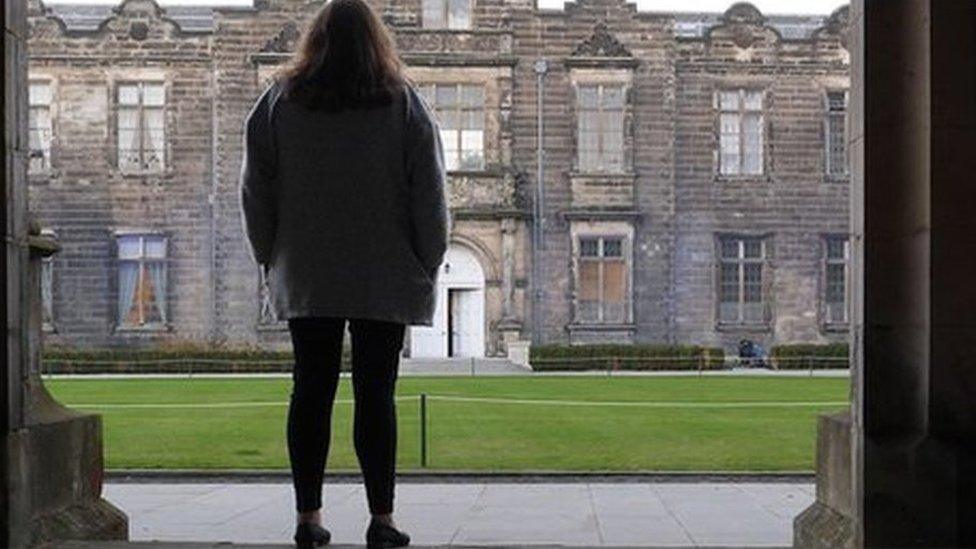
Miss M is leading the campaign to have the not proven verdict scrapped
A rape victim who won a civil case against her attacker is calling for Scotland to get rid of the "not proven" verdict in criminal courts.
The woman, known as Miss M, says the verdict is confusing and should be scrapped.
She is supported by women's groups who are concerned it gives juries an "easy out" in rape trials.
A number of legal experts disagree and say the current three-verdict system works.
What is the not proven verdict?
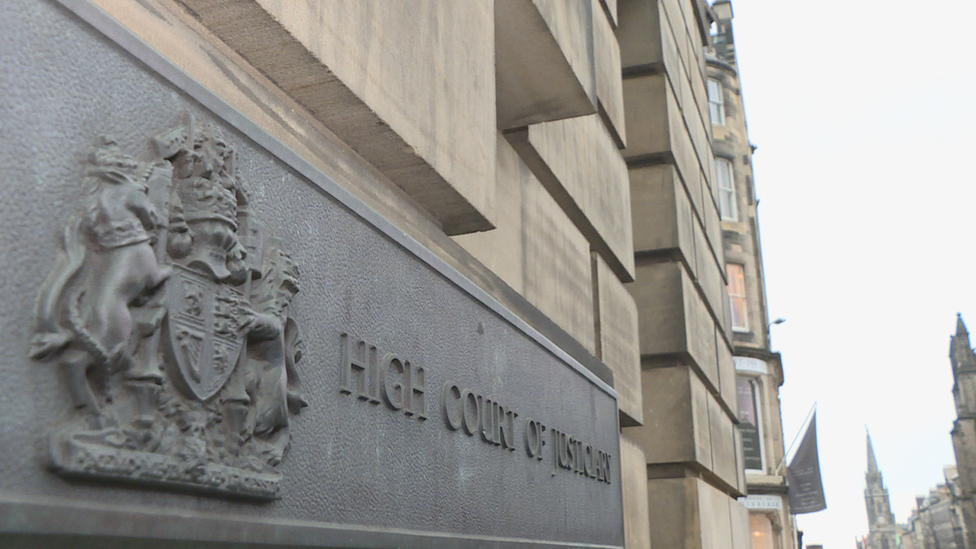
Scotland, unlike most of the world's legal systems, has three possible verdicts in criminal cases - guilty, not guilty and not proven.
The legal implications of a not proven verdict are exactly the same as not guilty verdict - the accused is acquitted and is innocent in the eyes of the law.
Should the not proven court verdict be scrapped?
Not proven is seen by some as offering additional protection to the accused, ensuring they will not be convicted if the jury has any doubts.
But critics argue that it is confusing for juries and the public, can stigmatise an accused person by appearing not to clear them and fails to provide closure for victims.
What happened to Miss M?

Stephen Coxen had denied the rape charges against him and the case was found not proven in a criminal court
Miss M claimed she was raped after a night out in St Andrews, when she was an 18-year-old student in 2013.
Stephen Coxen denied the charges against him and in November 2015 a jury in a criminal court gave a not proven verdict.
However, last month, in a case understood to be the first of its kind in Scotland, a sheriff in a Personal Injury Court ruled that Coxen had raped the woman and demanded he pay damages.
Miss M told BBC Scotland that when she received a not proven verdict in the criminal case it was "devastating" and "confusing".
She said: "I did not understand the difference between not proven and not guilty. I then found they were essentially the same in the eyes of the law."
What is the argument against not proven?
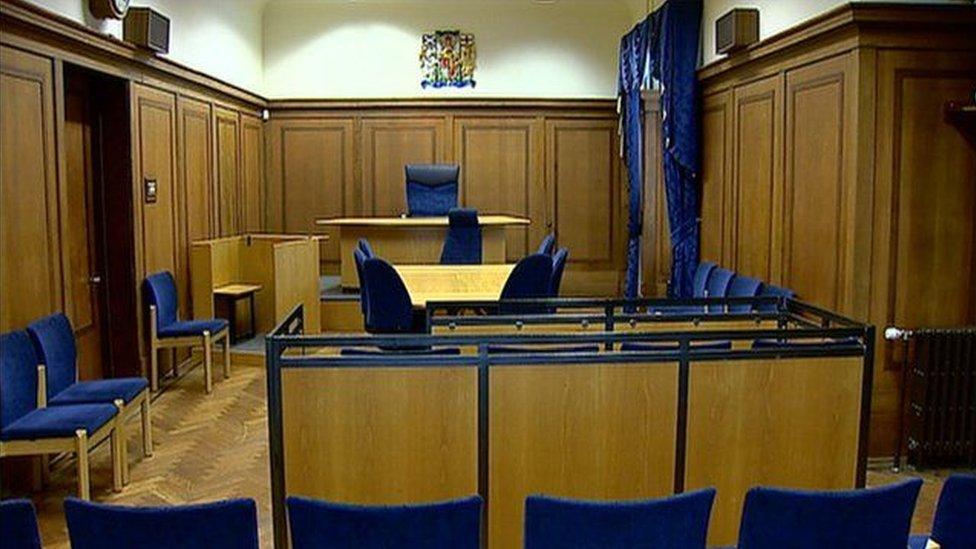
Almost three years ago, Holyrood's justice committee concluded Scotland's not proven verdict was on "borrowed time" and may not serve any useful purpose.
The justice committee heard evidence that there was no legal difference between a not guilty and not proven verdict.
But it was told that not proven could carry a stigma for an accused person, as well as failing to provide the necessary closure for victims.
Its report said the verdict could lead to the "effective defamation" of the accused where the public believes the not proven verdict implies they "got away with it".
The verdict was also said to be "deeply unsatisfactory" for alleged victims.
The new campaign to get rid of the not proven verdict is being launched by Rape Crisis and Miss M and is backed by organisations including Scottish Women's Aid.
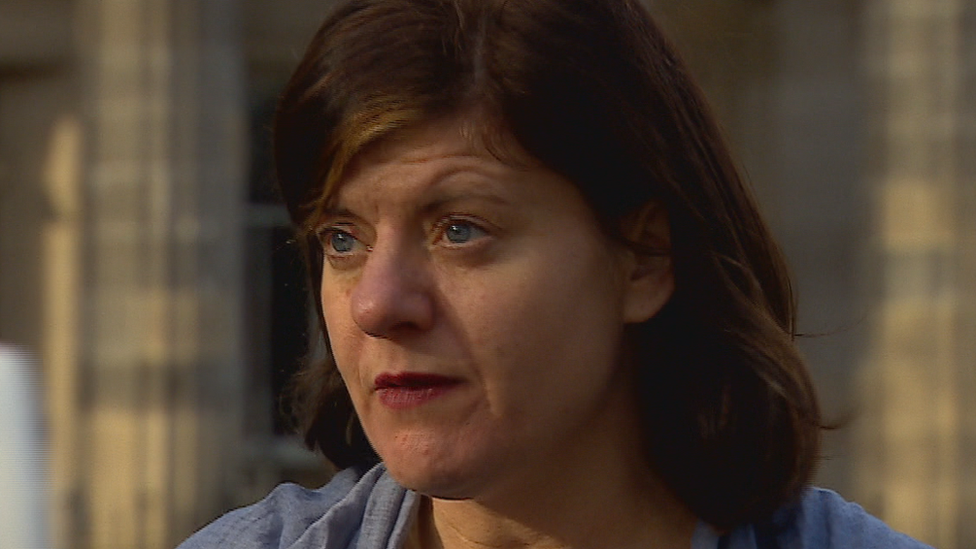
Sandy Brindley said the not proven verdict is used disproportionately in rape cases
Sandy Brindley of Rape Crisis Scotland, told the BBC that some see the not proven verdict as somehow "less painful" for those accusing rape than a not guilty verdict.
She said the reality was that it was "devastating".
Ms Brindley said: "What we know is that the not proven verdict is used disproportionately in rape cases and it has the exact same impact as not guilty in terms of acquitting the accused but our concern is that it gives an easy out for juries in rape trials."
This is not the first time families and victims have campaigned against this distinctly Scottish and historical verdict but this time campaigners say they hope it will be different because it is being looked at in research commissioned by the Scottish government.
The research by Glasgow University is expected to report back in autumn 2019.
What happened to previous campaigns?

The body of Amanda Duffy was found on waste ground in Hamilton in 1992
Joe Duffy has fought for decades to try to get rid of the verdict.
His daughter Amanda was murdered 26 years ago.
He told the BBC that at the time it had been a shock to find out not proven had the same effect as not guilty.
"I was like most of the public at large just now, I did not realise it did not mean anything," he said.
"I actually thought it meant if there was more evidence you could bring somebody back to trial.
"To discover it was a full acquittal was a shock to me to be honest."
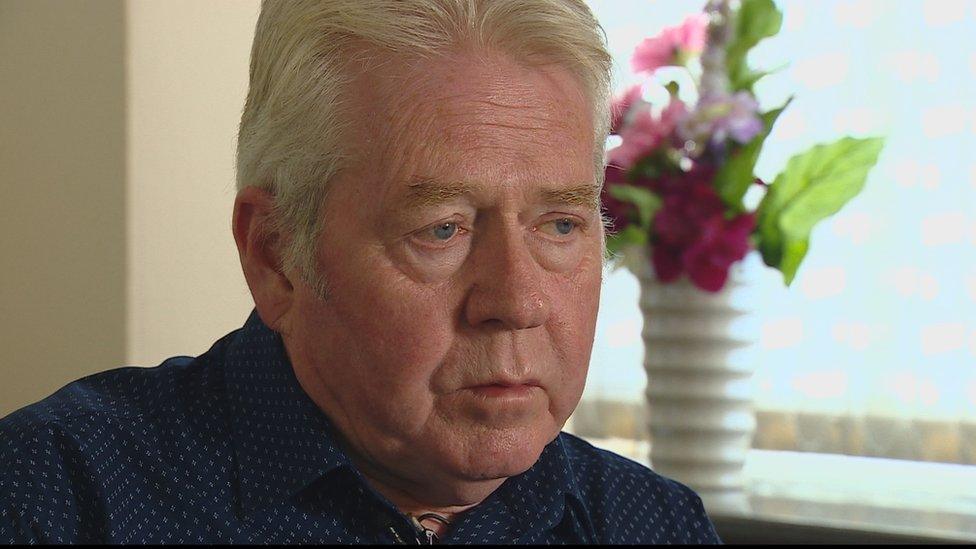
Joe Duffy said he was shocked to find not proven meant acquittal
He said: "The not proven verdict is a total enigma."
"It's a verdict that doesn't mean anything.
"Why can the defence get a two-to-one chance of getting someone off? That is exactly what it is - a complete nonsense. It is outdated and outmoded and needs to go."
What is the argument in favour of not proven?

Brian McConnachie QC said juries understood what the verdicts meant
Brian McConnachie QC, a former president of the Criminal Bar Association, said juries understood the fact there were two acquittal verdicts in Scotland.
"The choice between them is simply a way of them indicating to the court which they feel best represents their verdict in the case," he said.
"I don't think it is an easy out at all."
Mr McConnachie said that if not proven did not exist then juries would find people not guilty.
"If they choose not proven rather than not guilty it reflects the fact simply that they are not satisfied the prosecution have proved their case," he said.
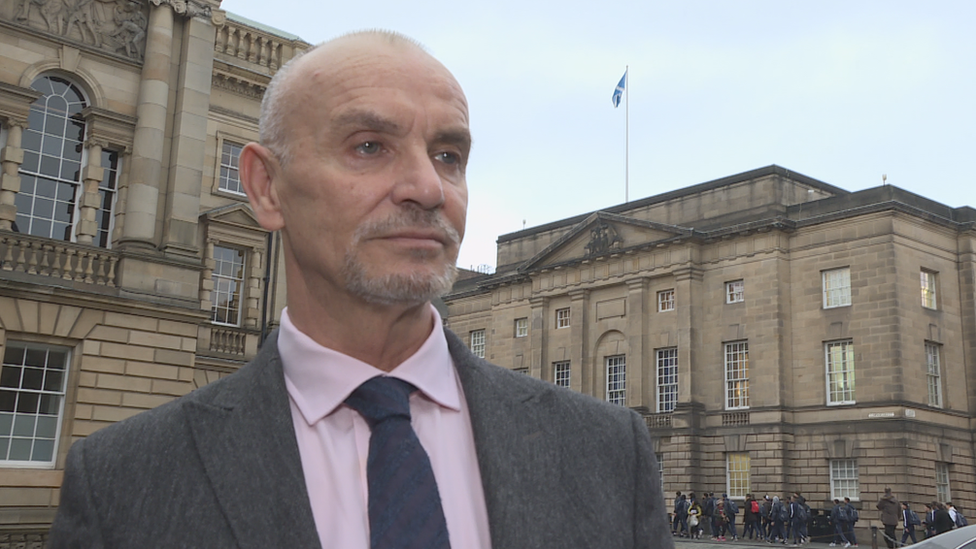
Advocate Derek Ogg said the verdicts should be proven and not proven
QC and advocate Derek Ogg told BBC Scotland he did not believe the current system was "demonstrably broken" so he did not see the need to fix it.
He said he saw no reason to change it but "given a blank sheet" he would prefer verdicts of proven and not proven, dropping the not guilty verdict.
Mr Ogg said juries in criminal cases were asked whether a charge was "proved beyond reasonable doubt".
He said: "That really focuses what the jury's job is.
"It asks 'has the evidence in the court made it sure and certain that this crime occurred?'.
"If we are not sure it is only right that the citizen who is on trial gets the benefit of the doubt and the verdict is not proven.
"Proven and not proven are the two logical verdicts."
In 2016, Douglas Thomson, of the Law Society's Criminal Law Committee, also said it was more logical to drop not guilty.
But, he said, the difficulty with dropping the not guilty verdict is that it is the "appropriate verdict of acquittal" recognised across the rest of the English-speaking world.
How often is not proven used?
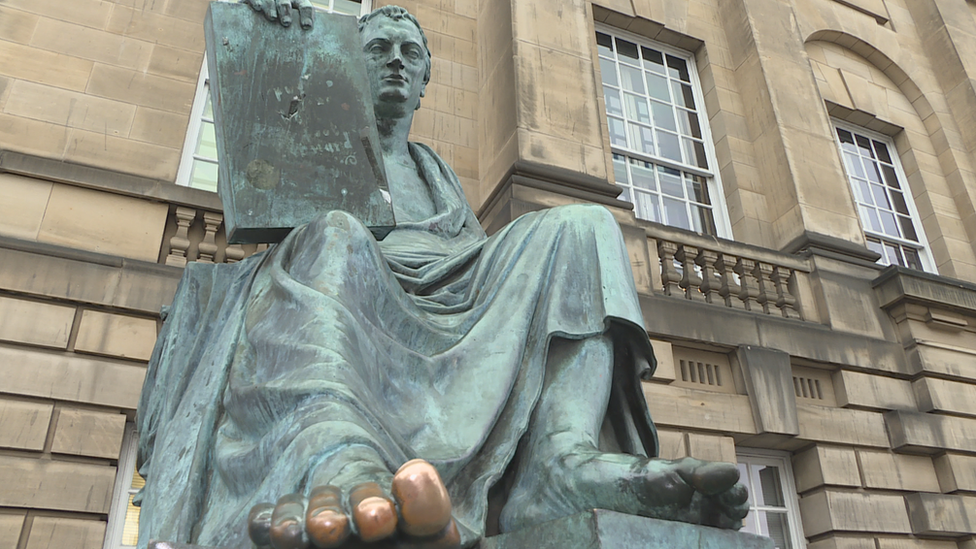
The vast majority of criminal cases end in a guilty verdict.
Of the 32,540 crimes that came to court in 2016-17 just 2,257 resulted in acquittal.
About one in five (21.5%) of acquittal verdicts were not proven.
The rate varied for different crimes with not proven verdicts being returned most often in homicides and attempted murder cases, where about 30% of acquittals were not proven.
In rape and attempted rape cases the conviction rate is much lower than the average, with more than half of cases resulting in an acquittal.
In 2016-17 there were 107 not guilty verdicts in rape cases and 42 not proven (about 28.2% of acquittals).
The number of not proven verdicts has risen over the past five years, but not as much as not guilty verdicts.
Why does Scotland have not proven?
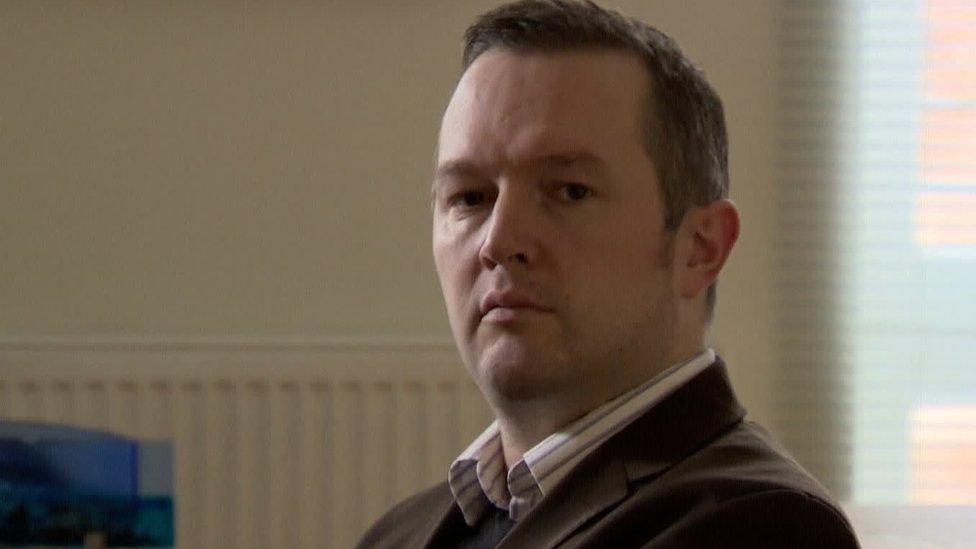
Prof James Chalmers is leading the research into the use of the not proven verdict
Prof James Chalmers, who is leading the research into the use of the not proven verdict, published a blog post last year with Prof Fiona Leverick looking at its history.
They state that there is a common misconception the not guilty verdict was a later addition to the proven and not proven outcomes.
The article cites Ian Willock's The Origins and Development of the Jury in Scotland as an authoritative history.
Willocks says that the not proven verdict was a "pure historical accident" rather than a "manifestation of the genius of Scottish criminal jurisprudence".
Prof Chalmers, regius professor of law at the University of Glasgow, says Scotland's early courts used a large variety of terms for guilt and innocence.
As the court system developed in the 17th Century the practice became that the jury merely found each of the charges proven or not proven and it was up to the judge to decide on guilt.
Willocks says that it was not until the 1728 trial of Carnegie of Finhaven that the jury's right to return a verdict of not guilty "was emphatically re-established".
However, "not proven" had become something of a legal fixture, and juries continued to use it alongside "guilty" and "not guilty".
Prof Chalmers says not only is the verdict of "not proven" not Scots law's original verdict of acquittal but today's "not proven" is used for a very different purpose from that for which it was introduced.
What does the Scottish government say?
A Scottish government spokesman said: "Lord Bonomy's Post-Corroboration safeguards review, external recommended that research be undertaken to better understand the dynamics of jury decision-making in Scotland's jury system.
"Ministers agree with Lord Bonomy that key components of the jury system - including the three verdicts, the simple majority required for conviction and the size of the jury - are inextricably linked.
"Any changes to Scotland's jury system, including the 'not proven' verdict, would best be made on an informed basis, so ministers will await the findings of the independent jury research before considering further."
Related topics
- Published15 October 2018
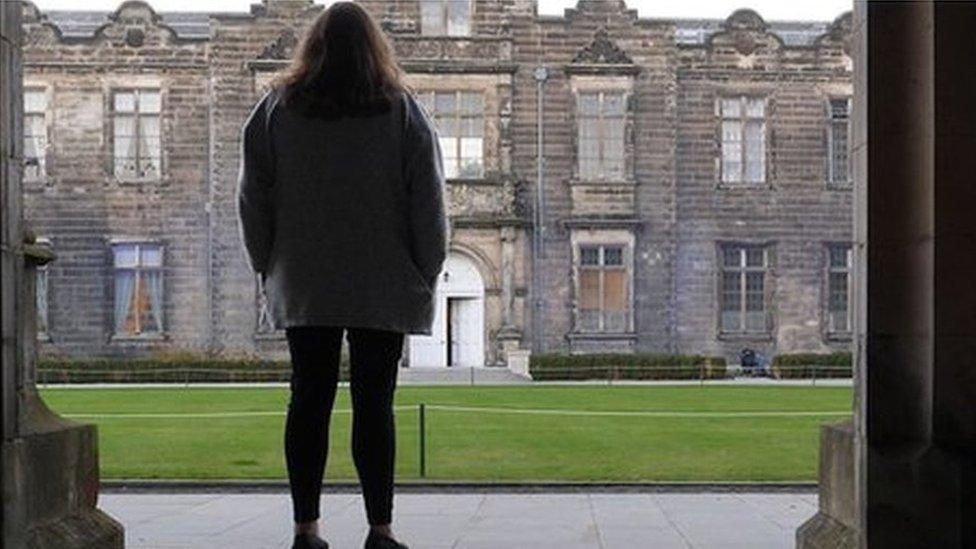
- Published5 October 2018

- Published24 September 2017

- Published29 July 2017

- Published13 September 2016

- Published9 February 2016
